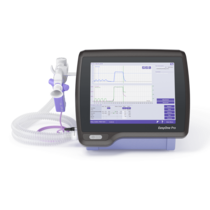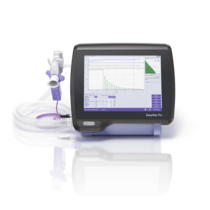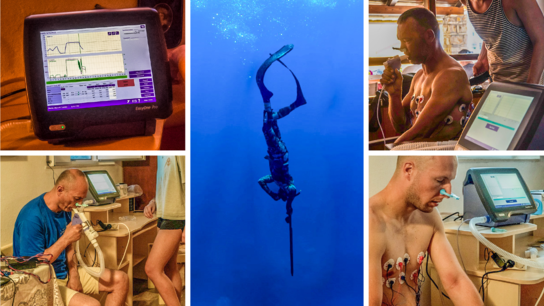HIV-Associated Impaired DLCO

Table of contents
Managing the care of people living with HIV (human immunodeficiency virus) has shifted significantly in recent years. In the past, PWH (people with HIV) were at substantial risk for opportunistic lung infections, but since the advent of antiretroviral therapy (ART), infections have decreased, and lifespan has increased. As PWH live longer, however, there are different challenges to overcome, including increasing incidence of chronic lung disease. Clinicians must now understand this population's unique issues to provide proper screening, diagnosis, and management of chronic lung conditions.
In the past, spirometry measurements, specifically the forced expiratory volume in one second (FEV1), to assess lung function in PWH was standard practice. Recently, however, there has been a shift towards the diffusing capacity of the lungs for carbon monoxide (DLCO) as a measure of pulmonary gas exchange and chronic lung disease assessment* that is now accessible and used routinely in clinical settings.
HIV-related DLCO reduction & respiratory symptons
According to a study published in 2013, in the Journal of Acquired Immune Deficiency Syndrome, HIV is an independent risk factor for reduced DLCO, most prominently in those with CD4 (white blood cell) counts lower than 200 cells per microliter and manifest with adverse respiratory symptoms.*
A reduced DLCO is also associated with worsening respiratory symptoms, including cough, phlegm, and breathlessness. Independent of antiretroviral therapy (ART) and viral suppression, PWH who are active smokers, have emphysema, obstructive lung disease, or abnormal DLCO measurements experience worsening symptoms, which can impose a significant negative impact on their quality of life.*
Impaired DLCO in PWH
The Study of HIV Infection in the Etiology of Lung Disease (SHIELD), a longitudinal cohort study, followed persons with and without HIV to understand the relationship between HIV and lung disease susceptibility. Data from the SHIELD study sought to describe the relationship between HIV and pulmonary gas exchange (DLCO) independent of emphysema and to identify the influence of HIV on DLCO impairment for participants with and without COPD.*
The SHIELD study had 339 participants who met quality standards and completed DLCO and CT (computer tomography) scan measurements. The demographics between PWH and uninfected participants were similar, although the HIV-uninfected participants had a higher median of pack years of smoking, and a higher percentage were current smokers. A total of 71 (64%) of the HIV-uninfected participants had COPD compared with 60 (26%) among PWH.
Results of the SHIELD study found that HIV was associated with significantly decreased DLCO % predicted with greater odds of DLCO impairment.
Further findings revealed that people with HIV and COPD had significantly worse DLCO values compared to people with COPD and without HIV. Even among participants without COPD, PWH still had a higher incidence of moderate-to-severe DLCO impairment with lower DLCO % predicted values than HIV-uninfected participants.
Overall, the SHIELD study was able to demonstrate that HIV is independently associated with decreased DLCO. The researchers also noted the possible influence between HIV and COPD on DLCO impairment.
Spirometry alone is not enough
A 2013 cross-sectional analysis sought to determine the pattern and severity of pulmonary function impairment of 300 HIV-infected and 289 HIV-uninfected men from 2009-2011. The participants completed pre- and post-bronchodilator spirometry, DLCO measurement, and standardized questionnaires.
The mean age of cohort participants was 54, and they were racially and ethnically diverse. More HIV-infected men were current smokers with more pack-years of smoking compared to HIV-uninfected men. Additionally, HIV-infected men were more likely to have smoked marijuana and used intravenous drugs. The HIV-infected men also had a higher incidence of prior bacterial or Pneumocystis pneumonia.
Most of the men in the cohort had normal airflow on spirometry. Only 18% of HIV-infected and 16% of HIV-uninfected men met the criteria for airflow obstruction.
DLCO measurements were significantly lower in HIV-infected men. Overall, 30% of the HIV-infected participants had a DLCO <60% predicted compared to 18% of HIV-uninfected.*
It’s important to note that an equal proportion of HIV-infected and HIV-uninfected men with a DLCO <60% of predicted normal value had no airflow obstruction on spirometry. Among participants with airflow obstruction, DLCO was substantially lower in HIV-infected men.
There was also a positive relationship between DLCO and low CD4 (white blood cell) count, revealing lower DLCO when cell count was <200 and between 200 and 349.*
A DLCO of less than 60% of predicted normal value was present in 30% of those with HIV and is consistent with moderate to severe pulmonary impairment. In this study cohort, spirometry measurement without DLCO would have missed the considerable gas exchange deficiency in HIV-infected and uninfected participants since 61% of those with moderate to severely reduced DLCO did not show airflow obstruction.
Reducing the burden
Although spirometry is the most studied pulmonary function test (PFT) in PWH, research is now finding that abnormal DLCO is the most common PFT abnormality among the HIV population.
Clinicians who understand the etiology of impaired DLCO have the opportunity to initiate better screening strategies to identify debilitating lung impairments.*
Further knowledge will also help devise effective treatments to improve the quality of life and reduce the rising burden of chronic lung disease in PWH.
Products

EasyOne Pro®
Portable DLCO, Lung Volumes and Spirometry

EasyOne Pro® LAB
Portable DLCO, MBW, Lung Volumes, LCI and Spirometry







